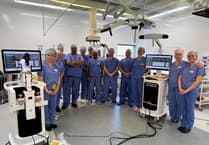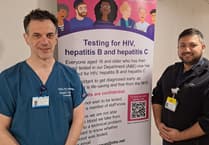Queen Alexandra (QA) Hospital in Portsmouth is struggling to cope with rising influenza cases with over 180 beds occupied by flu and Covid patients.
Health bosses have issued advice on how residents can help tackle the rising demand for urgent care seen across the country.
Mark Roland, deputy medical director at Portsmouth Hospitals University NHS Trust, which runs QA, said: "Our hospital remains very busy and many of the people who are attending the hospital at the moment have viral infections, particularly flu and Covid.
"What we’re seeing in our emergency department and through to our wards is that a large number of people, particularly with pre-existing respiratory problems, are becoming very unwell with flu especially, developing significant breathlessness and wheeze and that is impacting our whole community, not just the hospital.
"Currently, there are over 180 people in our beds either with flu or Covid or with both.
"If you are in an at-risk group, you should have already been contacted by your GP surgery about getting vaccinated. If you haven’t been vaccinated, there’s still time.
"Please get in touch with your GP surgery or contact your local pharmacy to get vaccinated and take protection for yourself and your loved ones from these difficult challenging viruses this winter."
The Portsmouth University NHS Trust asked people last week to take their relatives or friends home as soon as they were declared ready to free up beds.
The trust declared a new critical incident after the hospital and the emergency department were struggling to cope.
It said the demand for urgent care in the area is "far outstripping" the capacity available.
Chief nurse Liz Rix said: "We know that the longer a patient stays in hospital the greater the risk of deconditioning where immobility and inactivity causes muscle weakness, walking difficulty and an increased risk of falls and injury.
"At a time when our services are really stretched, the extra support patients receive from those closest to them can really help with their recovery and return to good health and independence.
"Just making sure your relative or friend is home safe, will not only help them recover but help us to care for another Portsmouth person who needs a hospital bed."
Influenza-like illness consultations have increased and remain higher compared to the previous four years.
Influenza admissions continue to rise with rates at their highest in those aged over 85 and in children under five years old.
Portsmouth City Council’s director of public health, Helen Atkinson, warns that high levels of influenza are adding "significant" pressures across the healthcare system.
She said: "The best thing you can do if you haven’t already, is get the flu vaccine. This greatly reduces the risk of more serious illness.
"We can also use a tissue to catch coughs and sneezes, wash our hands often, and keep a distance from anyone with flu-like symptoms."
If eligible, having the flu vaccine is said to be the most ‘important preventative measure’ you can take to protect yourself and others from serious illness.
The flu vaccine is made available every year on the NHS to adults over the age of 50 including those who will be 50 by March 31. If you’re eligible it’s likely you can also get the Covid-19 autumn booster.
You can take the flu vaccine at your GP surgery, a pharmacy offering the services or at some maternity services if you’re pregnant.
Primary school-aged children will be offered a free flu vaccine at school or a community clinic, which is a quick and easy nasal spray.
Further advice for reducing the transmission of winter viruses follows the same messaging shared over the Covid-19 pandemic:
Catch it, Kill it, Bin it – catch coughs and sneezes using tissues and throw them in a bin
Hands, Face, Space, Ventilate – wash your hands, wear a face mask, keep your distance and ventilate rooms when meeting people with flu-like symptoms.
The flu will normally improve on its own but can make some people seriously ill.
The symptoms of flu include, but are not limited to, a high temperature, aches, fatigue, a dry cough, sore throat, headaches, difficulty sleeping, loss of appetite, an upset stomach and nausea.
The NHS advise, if you have the flu, to keep well rested, stay warm, drink plenty of water and take paracetamol and ibuprofen to lower your temperature and treat aches and pains.
To help relieve pressure on QA Hospital, and to ensure patients get the right care, it’s important to know where to go for help. For non-life-threatening issues please consider the following services:
* Pharmacies for expert advice on headaches, aches and pains
* Your GP practice for symptoms that don’t go away or ongoing health concerns. You can contact your GP by phone or online through e-consult.
* Urgent Treatment Centres for minor conditions such as sprains, strains, broken bones, burns and wounds. Call 111 for an appointment or just turn up at the nearest UTCs:
Mary’s Hospital, 8am-8pm every day
Petersfield Hospital, 8am-8pm every day
Gosport War Memorial Hospital, 8am-8pm every day
* Healthier Together offer urgent medical help for those aged 0-18
* Mental Health Services are available for anyone needing support
* NHS 111 online is for urgent medical help that isn’t an emergency.
If you have a life-threatening or serious emergency call 999 or attend the emergency department. These emergencies include severe chest pain, breathing difficulties, stroke, loss of consciousness or heavy bleeding that cannot be stopped.
For more information including when to contact your GP or get help through NHS 111 visit: www.nhs.uk/conditions/flu/





Comments
This article has no comments yet. Be the first to leave a comment.